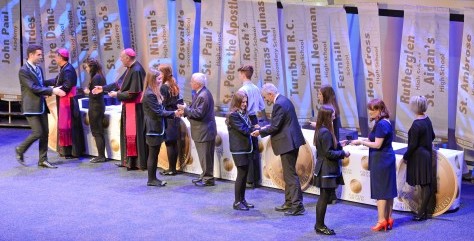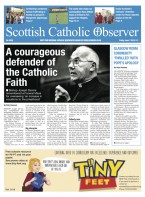BY No Author | March 29 2019 | ![]() 0 COMMENTS
0 COMMENTS ![]() print
print

Catholic schools serve poorer areas yet are more likely to hit exam targets
Publication Date: 2019-03-29
New figures show Catholic schools are more likely to educate pupils living in deprived areas and also more commonly hit government exam targets than non-denominational schools — By Daniel Harkins, James Farrell and Peter Diamond.
Catholic secondary schools in Scotland are more likely to educate pupils from deprived areas and from minority ethnic groups than non-denominational schools, yet a higher percentage hit exam target benchmarks drawn up by the Scottish Government.
Analysis of figures released by the government this month show that in 21 per cent of Catholic secondary schools, more than half of all pupils come from the most deprived data zones in the country.
The same figure for non-denominational schools is eight per cent.
Similarly, 72 per cent of Catholic high schools have a student population where more than 20 per cent of pupils come from the most deprived areas, while for non-denominational schools the same figure is just 34 per cent.
For primary schools, the figures are even starker. 37 per cent of Catholic primaries take more than 50 per cent of pupils from the most deprived areas of Scotland, while only 13 per cent of non-denominational primaries take half their pupils from the most deprived neighbourhoods.
Despite the increased rates of poverty, Catholic schools are more likely than non-denominational schools to hit government benchmarks for pupils who achieve five or more Highers.
This benchmark shows how well pupils perform compared to those in similar areas elsewhere in the country, and indicates what results a school is expected to achieve.
63 per cent of Catholic schools hit or exceeded their benchmark, while just 45 per cent of non-denominational schools performed at expected levels.
In Dundee for example, Catholic schools St Paul’s and St John’s have among the highest ranks for deprivation, with 51 and 61 per cent of pupils coming from the most deprived areas. Both schools however met or exceeded their benchmark. In contrast, all six of the city’s non-denominational schools failed to meet their benchmark, despite taking less pupils from deprived areas.
Similarly, in Airdrie, the Catholic school, St Margaret’s High, takes half of its pupils from the most deprived areas, yet beat its benchmark by seven per cent. The non-denominational schools in the town, Airdrie Academy and Caldervale High, take 35 and 38 per cent of their pupils from the most deprived areas, but failed to meet their benchmark by four and five per cent respectively.
Outliers
The statistics generally show that, across the country as a whole, schools with large numbers of pupils from deprived areas have fewer pupils achieving five or more Highers, but many Catholic schools are bucking the trend.
St Andrew’s Secondary in Carntyne, Glasgow, takes 75 per cent of its pupils from the most deprived areas, but beat its benchmark by 10 per cent.
St Thomas Aquinas in the city draws half of its pupils from areas of extreme poverty, but beat its benchmark by 14 per cent.
Other Catholic schools to significantly exceed their benchmark despite serving areas of deprivation include Notre Dame in Glasgow, St Luke’s in Barrhead, Our Lady’s High in Motherwell, St Margaret’s High in Airdrie, St Peter the Apostle in Clydebank, St Matthew’s Academy in Saltcoats and John Paul Academy in Glasgow.
In total, eight of 14 schools that take more than half of their pupils from the most deprived areas met or exceeded their benchmark.
Catholic secondary schools are also more likely to educate children from minority ethnic groups.
In 25 per cent of Catholic secondary schools, more than 20 per cent of the pupils are from minority ethnic groups, while the same figure for non-denominational schools is 15 per cent.
‘A wider view’
Barbara Coupar, director of the Scottish Catholic Education Service, said the statistics ‘offer a wider view than simply looking at the ‘league tables’ and affirm that Catholic schools are continuing to serve Scotland well.’
“The catchment area for Catholic schools is naturally always larger than their non-denominational neighbours and so the make-up of our pupils is inevitably more comprehensive,” she said.
“Catholic Social Teaching has always called on us to pay particular attention to the poor and we know that this does not always just mean financial poverty.
“Our Catholic schools pride themselves on meeting the academic, spiritual, physical and emotional needs of our children and the success of this distinctive approach to education can be seen, not only in the exam results, but in the positive destinations of our young people as they leave school and take their place in the world.
“This success is connected to the mission of the Catholic school and that is why we place such emphasis on the ethos, vision and values that are at the heart of our schools.
“If we want to continue being successful in removing the barriers to learning that our children from the most deprived areas face, then we need to ensure that our Catholic schools continue to have the freedom and support for their distinctive mission.”
‘Platform for success’
St Matthew’s Academy in Saltcoats exceeded its benchmark despite 51 per cent of its pupils coming from the most deprived areas in the country.
Headteacher Stephen Colligan said combining Gospel values with the curriculum ‘creates a better platform for success.’
“Our Catholic school benefits from a strong sense of identity and community that is nurtured throughout the school and we try and include our families in that as much as possible to make a positive impact in both pupil and parent’s lives,” he said.
“We believe that if we inform the children through our curriculum and align that with Gospel values it creates a better platform for success.
Mr Colligan added: “In our school environment we always strive to create opportunities for our children that will not only benefit them but also our parishes, families and the wider community.
“Those opportunities cannot be captured in hard data but they play a key role in shaping and developing values, spirituality which in turn benefits the pupils’ overall development.
“The data won’t include the number of children involved in Caritas awards or the amount of volunteering and almsgiving that goes on in schools especially during Lent and Advent, but that is what really defines them and makes them great.
“Yes, exam success gives pupils a passport to the next stage of their education or lives but as educators we don’t see it as being the full stop.
“Creating success is an ongoing process but as teachers we have a constant drive to improve the opportunities for our young people.
“It’s not about getting to the top of these school league tables, it’s all about getting individual children to the top of their own ‘league table.’
“Staff are key to that; thankfully the staff in my school are driven by creating opportunities for our young people that allows them to be the best possible versions of themselves.
“I would say all staff in Catholic schools are exceptionally hard-working and they constantly go above the call of duty to the benefit of our young people.”
Catholic ethos
Ms Christine Downie, headteacher at St Luke’s High School, Barrhead said: “Our values underpin everything we do, therefore we understand that teachers are here as a vocation and are called by God to do the best by our young people.
“I would say the figures reveal that we care very much about every child as an individual.
“Our ethos is that we want every child to flourish, so we try to be creative in the support and innovation that we give our pupils.
“Here we are also very lucky to have such a strong parental and parish support.
“They understand the levels of poverty some of our young people face and our parent council and parish really help in so many ways.
“Great pastoral support can really make a difference to a school and we are always looking at ways of improving that too.
“This year we have a new programme on St Luke the Evangelist to help bridge the gap between the Pope Francis Faith award and our Caritas awards.
“So I think the whole joined up approach where the child is at the centre of everything really makes a difference.”










